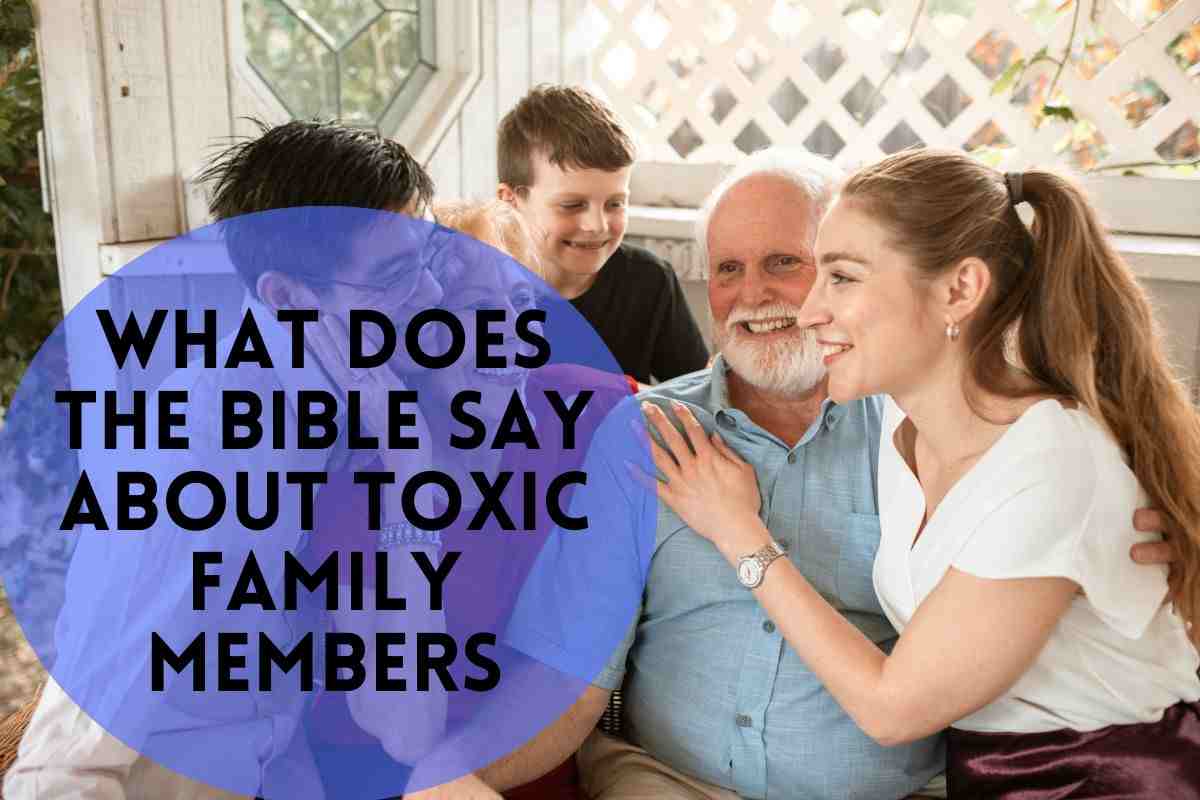Family relationships play a significant role in shaping our lives, providing us with love, support, and a sense of belonging. However, there are instances when these familial bonds can turn toxic, burdened with conflict, dysfunction, and emotional turmoil. Dealing with toxic family members can be challenging, leaving us grappling with questions about forgiveness, boundaries, and our own well-being.
In the search for guidance and solace, many turn to religious texts for wisdom and direction. The Bible, one of the most revered and influential books in human history, offers profound insights into various aspects of life, including the complex dynamics of family relationships. Exploring what the Bible has to say about toxic family members can provide us with valuable perspectives and principles to navigate these challenging situations.
What Does The Bible Say About Toxic Family Members
Toxic family members refer to individuals within a family who consistently exhibit harmful behaviors and create a negative and unhealthy environment. These individuals may display traits such as manipulation, control, emotional or physical abuse, constant criticism, or a lack of empathy. Their actions and attitudes can have a detrimental impact on the well-being and relationships of other family members.
Importance of understanding biblical perspective on toxic family dynamics
Understanding the biblical perspective on toxic family dynamics is crucial for several reasons. First, the Bible provides guidance and wisdom on how to navigate difficult relationships and challenges within the family unit. It offers principles that can bring clarity and direction when dealing with toxic behavior.
Second, gaining a biblical perspective helps individuals in toxic family situations to approach these dynamics with love, grace, and wisdom, rather than being driven solely by their emotions or negative experiences. It allows individuals to seek a higher purpose and a deeper understanding of God’s plan for their lives, even amidst difficult family circumstances. Finally, exploring the biblical perspective on toxic family members can bring healing and hope by pointing individuals to the redemptive power of God and His ability to restore broken relationships.
Biblical Principles of Love and Respect
Love and respect as fundamental principles in family relationships
The Bible emphasizes love and respect as fundamental principles for healthy family relationships. Ephesians 5:33, states, “However, let each one of you love his wife as himself, and let the wife see that she respects her husband.” This verse highlights the importance of love and respect in the context of marriage, but the principles extend to other family relationships as well. Love involves showing genuine care, compassion, and selflessness towards family members, while respect entails valuing the dignity, worth, and opinions of each individual.
Scriptural references emphasizing love and respect within the family unit
1. Ephesians 6:1-3 – “Children, obey your parents in the Lord, for this is right. Honor your father and mother… that it may go well with you and that you may live long in the land.” This verse highlights the command for children to obey and honor their parents, demonstrating the importance of respect within the family structure.
2. Colossians 3:13 – “Bear with each other and forgive one another if any of you has a grievance against someone. Forgive as the Lord forgave you.” This verse encourages love, patience, and forgiveness within family relationships, even in challenging situations.
3. 1 Corinthians 13:4-7 – Known as the “Love Chapter,” this passage describes the characteristics of love, including patience, kindness, humility, and selflessness. Applying these principles within the family unit fosters healthy dynamics and promotes healing.
Recognizing Toxic Family Patterns
Identifying traits and behaviors of toxic family members
1. Manipulation: Toxic family members often employ manipulative tactics to control or dominate others, using guilt, fear, or coercion to get their way.
2. Verbal or physical abuse: Toxic family members may engage in abusive behaviors, such as name-calling, insults, physical violence, or emotional aggression.
3. Lack of empathy: They may demonstrate a consistent lack of empathy, disregarding the feelings and needs of others.
4. Enabling destructive behaviors: Toxic family members may enable destructive habits or addictions, prolonging unhealthy patterns within the family.
5. Constant criticism or belittlement: They frequently criticize and belittle others, undermining their self-esteem and emotional well-being.
Understanding the impact of toxic dynamics on individuals and the family as a whole
Toxic family dynamics can have profound and lasting effects on individuals and the overall family unit. It can lead to emotional and psychological distress, low self-esteem, anxiety, depression, and strained relationships.
The toxic behavior may create a cycle of dysfunction that perpetuates negative patterns across generations. It can hinder personal growth, disrupt healthy communication, and impede the development of trust and intimacy within the family. Recognizing the impact of toxic dynamics is vital for individuals to seek healing, set boundaries, and strive for healthier relationships.
Setting Boundaries
The biblical basis for establishing healthy boundaries
The Bible supports the establishment of healthy boundaries in relationships. Proverbs 25:28 states, “A man without self-control is like a city broken into and left without walls.” This verse illustrates the importance of setting boundaries to protect oneself from harm and maintain emotional well-being. Jesus also modeled setting boundaries by prioritizing time alone for prayer and self-care (Mark 1:35). Boundaries help individuals establish clear expectations, protect their physical and emotional boundaries, and maintain their sense of identity.
Practical guidance for setting boundaries with toxic family members
1. Identify your limits: Reflect on what behaviors or actions are unacceptable to you and define your personal boundaries.
2. Communicate assertively: Clearly and respectfully communicate your boundaries to the toxic family member, expressing your needs and expectations.
3. Consistency: Be consistent in enforcing your boundaries and reinforcing consequences when they are violated.
4. Seek support: Reach out to a trusted friend, counselor, or pastor who can provide guidance, encouragement, and accountability as you navigate boundary-setting.
5. Practice self-care: Engage in self-care activities that promote emotional well-being, such as exercise, hobbies, or spending time with supportive individuals.
Forgiveness and Reconciliation
The biblical call to forgiveness
The Bible emphasizes the importance of forgiveness in various passages. Ephesians 4:32 states, “Be kind to one another, tenderhearted, forgiving one another, as God in Christ forgave you.” Forgiveness is a commandment and an act of obedience to God. It involves releasing feelings of resentment, and bitterness, and seeking reconciliation with the offender.
Differentiating forgiveness from reconciliation in toxic family relationships
Forgiveness and reconciliation are distinct concepts. Forgiveness is a personal decision to let go of negative emotions and extend grace to the offender, regardless of their response or change in behavior. Reconciliation, on the other hand, involves restoring the relationship to a state of trust and harmony, which may not always be possible or advisable in toxic family relationships.
Exploring the possibilities and limitations of reconciliation
In toxic family dynamics, reconciliation may be challenging due to ongoing abusive or harmful behavior. Reconciliation requires genuine repentance, willingness to change, and a commitment to healthy boundaries. It may be necessary to prioritize safety and well-being over immediate reconciliation.
However, it is still possible to forgive and release the burden of resentment, even if full reconciliation is not attainable. Seeking wisdom from trusted mentors or counselors can help navigate the complexities of forgiveness and discern the appropriate steps for moving forward in toxic family relationships.
Seeking Support and Guidance
The role of the church community in addressing toxic family dynamics
The church community can play a vital role in supporting individuals dealing with toxic family dynamics. It provides a safe space for individuals to share their struggles, seek advice, and receive encouragement. The church community can offer prayer, biblical guidance, and a sense of belonging, reminding individuals that they are not alone in their challenges. Fellowship with other believers can also provide a support network and accountability as individuals navigate difficult family relationships.
Seeking counsel from pastors, mentors, or Christian counselors
Pastors, mentors, or Christian counselors can offer valuable guidance and support when dealing with toxic family members. These individuals can provide a listening ear, offer biblical insights, and help individuals gain clarity on their situations. They can assist in developing strategies for setting boundaries, managing emotions, and navigating difficult conversations. Christian counselors, in particular, are trained professionals who can provide specialized support and therapeutic interventions tailored to the unique challenges of toxic family dynamics.
Recognizing the importance of personal growth and healing
In the midst of toxic family dynamics, it is essential to prioritize personal growth and healing. This involves self-reflection, identifying and addressing any wounds or traumas, and seeking avenues for growth and development. It may include engaging in counseling, participating in support groups, or pursuing personal development resources. Taking intentional steps toward healing and growth allows individuals to break free from the cycle of toxicity, develop healthier coping mechanisms, and cultivate a stronger sense of self.
Coping Strategies
Practical tips for managing interactions with toxic family members
1. Set clear boundaries and communicate them assertively.
2. Limit exposure to toxic family members when necessary for your emotional well-being.
3. Practice active listening and empathetic communication without engaging in arguments or confrontations.
4. Seek healthy outlets for stress and emotions, such as journaling, exercise, or creative activities.
5. Maintain a support system of trusted friends or family members who can provide perspective and encouragement.
Cultivating a healthy mindset and self-care practices:
1. Prioritize self-care activities that promote physical, emotional, and spiritual well-being.
2. Practice self-compassion and forgiveness toward yourself for any perceived shortcomings or past mistakes.
3. Engage in positive affirmations and gratitude exercises to foster a healthy mindset.
4. Engage in activities that bring joy and fulfillment, such as hobbies, nature walks, or spending time with loved ones.
5. Engage in spiritual practices, such as prayer, meditation, or studying Scripture, to find strength and guidance.
Focusing on personal growth and spiritual development
1. Seek personal growth resources, such as books, podcasts, or workshops, that address healing from toxic family dynamics.
2. Engage in self-reflection and introspection to identify areas for personal growth and development.
3. Pursue opportunities for learning and acquiring new skills that contribute to personal empowerment.
4. Nurture your relationship with God through prayer, worship, and deepening your understanding of His Word.
5. Embrace the journey of personal growth, recognizing that healing and transformation take time and effort.
The Role of Faith and Prayer
The power of faith in navigating toxic family relationships
Faith plays a significant role in navigating toxic family relationships. Trusting in God’s guidance and sovereignty provides individuals with hope, strength, and wisdom to navigate difficult situations. It allows them to lean on God’s promises and seek His perspective in challenging moments. Faith reminds individuals that they are not alone and that God is actively involved in their lives, providing comfort and guidance as they navigate toxic family dynamics.
Turning to prayer for guidance, strength, and healing
Prayer is a powerful tool for individuals dealing with toxic family dynamics. It offers a means to connect with God, express emotions, seek guidance, and find solace. Through prayer, individuals can find the strength to set boundaries, extend forgiveness, and seek healing. It opens a channel for individuals to release their burdens, surrender their concerns to God, and invite His transformative work into their lives. Prayer brings peace, clarity, and a sense of God’s presence amidst the challenges of toxic family relationships.
Hope and Restoration
Biblical examples of God’s redemption and restoration of broken relationships
The Bible provides numerous examples of God’s redemption and restoration of broken relationships. One notable example is the story of Joseph in the Old Testament (Genesis 37-50). Despite being betrayed and mistreated by his own brothers, Joseph eventually forgave them and was instrumental in reconciling with them, bringing restoration and healing to their family. This story highlights God’s ability to redeem and transform even the most broken relationships.
Encouragement for individuals experiencing toxic family dynamics
Individuals facing toxic family dynamics can find encouragement in knowing that God specializes in bringing hope and restoration to brokenness. God is able to heal wounds, mend broken hearts, and transform toxic relationships. Through faith, prayer, and seeking His guidance, individuals can find strength and resilience to navigate their circumstances. They can also find comfort in knowing that their ultimate identity and worth come from being a child of God, regardless of the dysfunction within their family. Trusting in God’s plan and His ability to work all things for good brings hope and a renewed sense of purpose, even in the midst of challenging family dynamics.
Conclusion
Throughout this exploration of what the Bible says about toxic family members, we have covered several important points. We defined toxic family members as individuals who exhibit harmful behaviors within the family, and we emphasized the significance of understanding the biblical perspective on toxic family dynamics.
Setting boundaries was highlighted as a crucial step in navigating toxic dynamics, while forgiveness and reconciliation were examined in the context of toxic family relationships. Seeking support and guidance, coping strategies, and the role of faith and prayer were discussed as vital aspects of dealing with toxic family members.
In dealing with toxic family members, it is crucial to seek God’s guidance and wisdom. By turning to Him in prayer and studying His Word, we can gain insight, strength, and clarity in navigating challenging family dynamics. God knows our specific situations and desires to walk alongside us, providing guidance and support. Through His wisdom, we can make informed decisions, set healthy boundaries, extend forgiveness, and pursue healing.
Dealing with toxic family members can be emotionally and mentally draining. It is essential to find support from trusted individuals such as pastors, mentors, Christian counselors, and a church community. These sources of support can provide encouragement, guidance, and accountability.
Additionally, pursuing healing through self-care practices, personal growth, and seeking professional help when needed is crucial. Remember that healing and growth take time, but with God’s help and the support of others, it is possible to find hope, restoration, and a healthier way of navigating toxic family dynamics.







